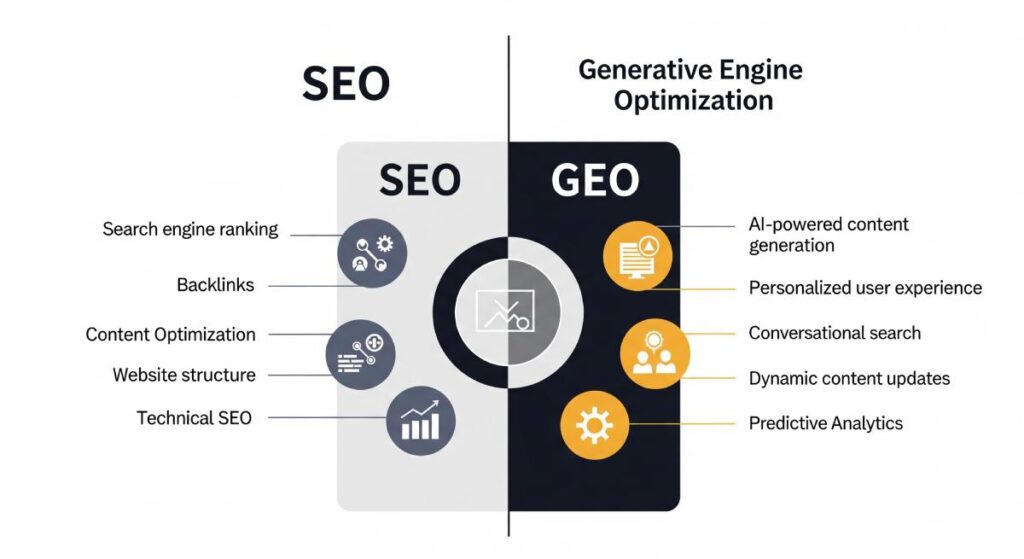The goal of every company and brand is to raise profitability, and attracting more clients is one of the best ways to boost the bottom line. Startups and larger corporations can use the internet to appeal to a broad audience and connect with those seeking their products or services.
Every company wants to see its name appear at the top of the results in search engine queries, and multiple approaches can be used to achieve this goal. However, it is essential to distinguish between national and local search engine optimization (SEO).
The target audience is the main factor that sets a national SEO campaign apart from a local one. Businesses that only provide their services in a specific location, such as a Pilates instructor in Baltimore or a dentist in Alexandria, would focus their SEO efforts on ranking in their local area. However, businesses that provide a service that can be carried out nationally and those with online stores selling products throughout the country need a robust national SEO campaign to get their name in front of as many potential customers as possible.
A Quick Breakdown Between Local SEO & National SEO
Many small businesses begin their SEO efforts by trying to rank locally, which is undoubtedly very important. However, ranking locally only helps you expand your reach beyond a specific area and put your name on the national stage. With national SEO, you can appeal to clients beyond your immediate scope and help make a name for yourself in your industry, which can be particularly useful if you are looking to expand in the future.
It is also helpful if you have goods catering to a larger audience. For example, if you operate a retail store in a small town, appealing to those in your community may be a top priority. However, the skyrocketing popularity of online shopping means that you can also market your products throughout the country with the right national SEO campaign.
It is important to remember that national SEO is not merely a scaled-up version of local SEO. It requires a different approach from ranking in your local area, and doing this successfully requires more specialized skills and detailed metrics. Ranking nationally can be very competitive, but it is often worth the effort as it will allow you to promote your brand nationally and enhance your brand perception. This can help you build trust among consumers.
Steps To Take Before A National SEO Campaign
Before embarking on a national SEO campaign, you will want to set up an SEO-friendly website, set goals to guide your efforts, and establish a team of qualified professionals to guide you to success.
Develop & Deploy An SEO-Friendly Website
Your company’s website is one of its most powerful marketing tools, but it must be set up correctly to be effective. Even the most visually appealing site will not do much for you if people cannot find it. Designing it with national SEO in mind can help your site rank well.
Begin by optimizing the architecture of your URL structure, which can help Google understand the content you post and help visitors find the information they need. You want the algorithms that crawl websites to understand what your site is about immediately. Use title tags with keywords, good meta descriptions, and easy-to-read content.
Optimizing site speed is also essential, as it directly affects your rankings. Pages that load faster often enjoy a lower bounce rate as visitors will spend more time on your page. Long page load times, in contrast, provide a negative experience for visitors and are viewed unfavorably by Google’s algorithm.
These days, ensuring your site is as mobile-friendly as possible is essential, as an increasing percentage of web traffic comes from mobile searches.
Set Quarterly & Annual Goals
A crucial component of success in any business endeavor is setting goals. National SEO campaigns can benefit significantly from setting achievable and realistic goals on a quarterly and annual basis.
Before you begin, consider your business objectives. Are you looking to build brand awareness, or are you more focused on sales? Are you hoping to promote your services in a specific geographic location, or are you trying to generate buzz for a particular product? The answers to these questions should guide your goals. Begin with broader goals and then determine how SEO can contribute to them.
Keep in mind the SMART guidelines when setting your goals. This acronym is considered the gold standard in business and states that goals should be:
- Specific: Avoid broad goals; choose something that will provide clear guidance.
- Measurable: Your goals should be measurable to determine when they have been met, such as improving traffic by 20 percent.
- Achievable: Choose something that is within your reach. A brand-new local dentist is very unlikely to rank number one nationally for “best dentist,” but you may be able to get a few long-term keywords in the top 5 in your first year.
- Relevant: The goals you choose need to serve your business’s ultimate aims, and you should ensure it is the right time to pursue them.
- Time-bound: Each goal should have a specific deadline that strikes a good balance between motivating and achievable.
It is also essential to set a mix of quarterly and annual goals. Quarterly goals are excellent for driving day-to-day tasks and decisions and getting some quick wins that can motivate you to keep pushing, but you should also be working toward longer-term goals at the same time.
Establish A Dedicated Team Of Marketers, Developers & PMs
An effective national SEO campaign will require a dedicated team of marketers, developers, and project managers who can devote the time needed to build and scale your company’s SEO efforts. The expertise and experience of the parties carrying out these roles will directly impact the success of your efforts. You must develop high-quality job listings to attract the right people to these roles.
If this is outside your business’s reach, hiring an SEO agency to handle this important task can help ensure that your efforts are focused in the right place. Many small businesses find that outsourcing their national SEO campaign to professionals is an excellent investment.
How To Effectively Prepare A National SEO Strategy
Preparing an effective national SEO strategy is a complex task that requires in-depth keyword research, an analysis of the competition, a strategic content marketing strategy, and a host of tools that can provide insight and guide improvements.
Execute In-Depth Industry-Based Keyword Research
Proper keyword research is essential for helping your site rank highly in search engine results and helping those who need your services find you. There are numerous resources available that can help you perform keyword research, including Google Analytics, Google Search Console and Google My Business, and search term reports if you use Google Ads. This can show you how your site performs, and the terms people search to find you.
Your competitors’ websites can also point to valuable information. Assess the keywords they feature on their site and the topics they discuss, and look to their best-performing posts for inspiration. This may guide you toward terms and issues that are being searched in your industry.
Another good approach is focusing on the benefits and features of your products and services, as these are high-intent keywords that people will likely use when looking to purchase.
Once you have compiled a list of potential keywords, you can run them through keyword research tools such as SEMRush and Ahrefs, which will help you find more opportunities related to these terms as well as keyword difficulty, search volume, and other data that can guide your decisions on which keywords to pursue. If you’re unsure where to start, you can even run your competitors’ sites through these tools to find new keywords and search term opportunities.
When choosing the keywords to target, it is essential to select a mix of broad and long-tail keywords. While general keywords attract a significant number of organic searches, the competition for ranking for these terms can be pretty high. Long-tail keywords tend to have fewer searches but are also less competitive, which means your business may be able to rank highly for them with relative ease. Consider the difference between ranking for a keyword like “yoga studio” versus a more specific one like “yoga studio for beginners.”
Some of the best keywords to start with are the easiest and most searched for, with a decent amount of volume and relatively low competition. These are considered low-hanging fruit and can help give your SEO efforts a kickstart while you wait for longer-term gains on more competitive keywords.
Next, you can map out a content plan that includes which keywords will be targeted and the URL and header structure you’ll use before passing it along to your content writers.
Perform A Gap Analysis Against The Competition
A content gap analysis can help you find the missing holes in your existing website content to make your overall content more connected and comprehensive.
However, you should also take this one step further by looking at what your competitors are doing and seeing how your site compares. You should not copy their strategy exactly, but this analysis can help you identify gaps in your approach to find areas where improvements can give you an edge.
Create & Plan Out A Strategic Content Marketing Strategy
Use your keyword research to guide the type of content that you will include on your company’s website. Managing content can be a major task, particularly for small businesses that have little time. Creating a calendar and using tools to schedule content posting in advance can make the task somewhat easier.
Content that covers a specific topic in great detail is one of the most effective approaches for national SEO. Google favors in-depth content over shorter blog posts as this tends to be more genuinely helpful to readers. In addition to attracting more natural editorial backlinks and traffic thanks to the higher number of keywords that will be naturally incorporated, it can also attract shares on social media and rank more highly.
First time creating a content marketing strategy and unsure where to start? We’ve got you covered.
Ensure Current Online Citations Have Correct Business Information
Any existing online mentions of your business are very powerful, but you must ensure they are kept up to date. They are instrumental in helping your site rank locally, which can also help build your national reputation.
If you have multiple physical business locations, this may require work; third-party services can help manage citations across multiple platforms. If you are building them manually, keep records of where they are and how to make changes when needed, such as when your business’s phone number, address, or website changes. If you find any inaccuracies or outdated information, correcting these should be a priority.
Set Up Google Analytics, Google My Business, & Google Search Console Accounts
The right tools can make all the difference in the success of your national SEO efforts. Before you start putting your strategy into action, set up accounts with the following useful tools:
- Google Analytics: Google Analytics offers a comprehensive range of information about your website, including goals and audience monitoring, visualizations, and custom reports on metrics such as page views, bounce rates, and conversions.
- Google My Business: This free Google feature can help you raise your business’s visibility and increase the chances of appearing in Google services like Search and Maps. It helps attract customers to businesses that have a physical location.
- Google Search Console: Previously known as Google Webmaster Tools, this can help you understand how Google’s search engine interacts with your website and offers core web vitals reporting, security issue and keyword monitoring, and website speed reports, among other features.
Important Factors To Consider When Executing A National SEO Campaign
When carrying out a national SEO campaign, the following factors should be considered.
Publishing Content Consistently
Digital content is the best way for most businesses to be discovered online at any level, but mainly on a national scale. If your small business has already mastered local SEO, your site may be full of content targeted to your geographical area. However, as part of a national SEO campaign, you will need to add more geography-agnostic content regularly. National content, unlike local contact, can be developed once and should continue to provide you with returns in the long term. However, developing and promoting requires more expertise and sophisticated writing skills.
Although it is helpful to map out a content strategy in advance, keep in mind that the best approach to content for your business will evolve as your site gains more visitors. You will notice the keywords that are performing well for you, and it can be very beneficial to remarket those keywords on other platforms, such as social media.
Continuously Monitoring & Improving On-Page SEO
SEO is about continuous progress, so you must constantly monitor your SEO and make changes as needed. There are many ways that on-page SEO can be improved, from managing metadata tags to optimizing keywords and images.
Performing Regular SEO Audits
Regular SEO audits are the best way to ensure your efforts continue to pay off. Google is constantly adjusting its algorithm, and the SEO strategies used by your competitors can also impact your ranking. Therefore, it is vital to check your performance regularly to identify when new approaches might be needed. Here is a brief overview of some of the SEO tools that can help your national SEO efforts:
- Google Search Console: This tool can help your company enhance the performance of its website by providing information about your site’s search traffic and the queries that lead people to this site. It can also help you fix website problems and get a better idea of how Google searches views and interprets your site’s pages. It also has training videos that explain how to get the most out of the tool.
- Google Analytics: While Google Search Console can provide you with a lot of information, Analytics can help to analyze data to help better inform your decisions. It enables you to measure the success of your marketing efforts and content strategy so you can make changes that get results.
- Other SEO software: Although understanding how Google views your site is extremely valuable, there are third-party SEO software platforms that can also provide useful insight. Platforms such as Moz and SEMRush can help with researching keywords and competitors, rank tracking, analyzing backlinks, and auditing your site.
Building Relevant, High-Authority Backlinks
You can boost your SEO efforts by building relevant, high-authority backlinks that improve your domain authority and help build your brand. Consider contacting bloggers, journalists, and others who can post relevant content and link back to your site or offer to write guest posts for them. Creating an industry report and sharing it with other publications is another good way to get backlinks. Consider asking industry podcasts to feature you, as they will likely link back to you when promoting your episode.
Remaining Active On Social Media & Responding To Online Reviews
Although social media may not directly contribute to how search engines rank your content, link sharing across social media platforms can raise your brand exposure in ways that few other approaches can, and this will influence your SEO. An effective social media presence can indirectly improve your search visibility and rankings via social metrics and signals such as shares, comments and likes.
Therefore, your brand needs to remain active on social media. Suppose your brand creates high-quality content that brings value to your audience and connects with readers. In that case, you may even find some of your consumers becoming advocates for your brand by engaging with your content and sharing it with their followers and friends.
Remember that high-quality content is more likely to be shared, and you can use social icons and links to make your website’s content easy for users to share. Encourage engagement and conversation by asking questions or requesting feedback. It is also essential to optimize your business’s social media profiles.
Be sure to stay on top of the online reviews your business receives and respond to them. Google for Small Business reports that consumers view companies that respond to their reviews as being 1.7 times more trustworthy than those that ignore them. You should respond to positive and negative reviews alike.
For example, you can acknowledge a positive review with a quick “thank you.” If the review comes from an in-person shopper, you might say, “We hope to see you again soon!”
Negative reviews can be more challenging to respond to. Responding to these reviews promptly and remaining professional and polite throughout the conversation are important. As difficult as it may be, avoid taking it personally and do not be defensive. Make sure you fully understand what the customer is trying to say before responding.
If you made any mistakes, be honest about them and outline the steps you have taken or intend to take to correct the situation. If the negative review is the first time you have heard of a specific customer’s complaint, ask them to call or e-mail you so you can try to sort it out one-on-one. Finally, sign off using your name or initials so everyone can see that a natural person takes a customer’s concerns seriously.
Analyzing Bounce Rates, Time On Page, & Conversion Metrics
While the precise mix of metrics that businesses need to consider can vary depending on their goals and business type, two specific metrics should always be prioritized for national SEO: bounce rate and time on page.
The bounce rate indicates how many users enter your site on a particular page and then leave it without taking further action. A high bounce rate may not be bad on a site with a single page, but it can indicate that you are not properly engaging your audience or moving them down the sales funnel on larger sites. If you have a page with a high bounce rate, find out whether the content is a good match for the marketing used to drive people to the page and whether it provides easy paths to the next step you wish visitors to take.
Time on page, as the name implies, measures how much time a user spends on a particular page and is used by Google to help determine how well your site performs. People who spend more time on pages are more likely to become paying customers. A high time on the page shows that people are engaging with your content and sticking around long enough to follow your call to action potential. A low time on the page indicates that your content needs to be overhauled.
You also need to analyze the SEO conversion rates relevant to your business. SEO conversion metrics indicate the percentage of your site’s visitors who take an action that moves them to the next step in your customer journey, whether that means filling out a form to request more information about your services or making a purchase.
Start Ranking Nationally With 321 Web Marketing Today!
It is possible to boost your company’s national SEO efforts on your own if you study best practices carefully. However, the amount of time and technical knowledge needed to stay on top of the latest changes and understand how they affect your site can make this task insurmountable for many businesses, especially smaller ones that need more funds for a dedicated in-house team of SEO experts. To enjoy the best national SEO results possible while still having enough time for your business’s daily tasks, outsourcing this vital effort to professionals is one of the most efficient ways to get the results you wish to achieve.
321 Web Marketing is a trusted national SEO company that can help your business with a broad range of SEO needs, from local and national SEO to competitor analysis, content creation, consulting, and keyword research. Help your business shine by reaching out to the reputable team at 321 Web Marketing today to discuss your company’s needs and learn more about our custom services.







